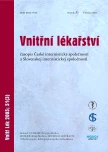-
Medical journals
- Career
The causes of acute intoxications in the course of one year admitted to intensive metabolic care unit
Authors: J. Charvát 1; T. Vaněček 1; M. Souček 1; Z. Baraníková 2; S. Kozáková 1
Authors‘ workplace: Interní klinika 2. lékařské fakulty UK a FN Motol, Praha, přednosta doc. MUDr. Milan Kvapil, CSc. 1; Klinika dětské psychiatrie 2. lékařské fakulty UK a FN Motol, Praha, přednosta doc. MUDr. Michal Hrdlička, CSc. 2
Published in: Vnitř Lék 2005; 51(3): 299-303
Category: Original Contributions
Overview
We present the survey of the patients admitted to Intensive metabolic care unit (IMCU) for acute intoxication during 1 year – 2002. During 2002 we have admitted altogether 677 patients to IMCU. Out of them 213 (31.5%) were admitted for acute intoxication, 100 men of the average age 36.8 ± 11.8 years and 113 women of the average age 41.5 ± 14.0 years. 6 patients were admitted twice for the reccurent intoxication. The most common cause for acute intoxication was suicidial attempt which was discovered in 149 cases of intoxication (68.1%), followed by toxicomania in 12.8%, alcohol intoxication in chronic alcoholics in 13.2%, accidentally in 3.6% of cases. Psychatric in-patient treatment was indicated in 91 cases afterwards. Hypnotics alone or in combination with alcohol were used in 85 cases (39%), only alcohol in 33 (15%), antidepresive drugs in 26 (12%), analgesic drugs in 15 (6.8%), opiods in 13 (6%). The mild and moredate intoxications represent 90% of all the cases. Only 10% of acute intoxications were severe with the need of the artificial ventilatory support and (or) elimination procedure. During 2002 one patient had died only due to accidental intoxication with etylenglycol. Short-term prognosis of the patients admitted for acute intoxication is very good. However many patients need the futher psychiatric treatment including hospitalisation in psychiatric department.
Key words:
intensive metabolic care unit – intoxication
Sources
1. Ševela K, Ševčík P, Kraus R et al. Akutní intoxikace v intenzivní medicíně. Praha: Grada 2002.
2. Rath D, Večeř J. Intoxikace u nemocných ošetřených v průběhu čtyř let na metabolické jednotce Interní kliniky 2. LF UK v Praze. Vnitř Lék 1998; 44(11): 654–657.
3. Viertel A, Weidmann E, Brodt HR. Cases of acute poisoning admitted to a medical intensive care unit. Dtsch Med Wochenschr 2001; 126(42): 1159–1163.
4. Juarez-Aragon G, Castanon-Gonzales JA, Perez-Morales AJ et al. Clinical and epidemiological characteristics of severe poisoning in an adult population admitted to an intensive care unit. Gac Med Mex 1999; 135(6): 669–675.
5. Leykin Y, Halpern P, Silbiger A et al. Acute poisoning treated in the intensive care unit: a case series. Isr J Med Sci 1989; 25(2): 98–102.
6. Larpin R, Vincent A, Perret C. Hospital morbidity and mortality of acute opiate intoxication. Presse Med 1990; 19(30): 1403–1406.
7. Henderson A, Wright M, Pond SM. Experience with 732 acute overdose patients admitted to an intensive care unit over six years. Med J Aust 1993; 158(1): 28–30.
8. Palazon Sanchez C, Segura Perez J, Renedo Villaroya A et al. Severe acute intoxication treated in the intensive care unit 1986–1997. Rev Esp Salud Publica 2000; 74(1): 55–63.
9. Pichot MH, Auzepy P, Richard C. Acute drug poisoning in suicidal elderly patients 70 years old and over. 92 cases in a medical ICU. Ann Med Interne 1990; 141(5): 429–430.
10. Fisker NJ, Andersen PK. Death after deliberate self-poisoning. A 10-year mate from an intensive care unit. Ugeskr Laeger 1993; 155(24): 1857–1861.
Labels
Diabetology Endocrinology Internal medicine
Article was published inInternal Medicine

2005 Issue 3-
All articles in this issue
- Multi-component automated collection – novel tendency in blood donating
- Hyperphosphataemia as an important complication of chronic renal insufficiency and chronic renal failure, part 1 – etiopathogenesis, consequences and diagnostics
- Hyperphosphataemia as an important complication of chronic renal insufficiency and chronic renal failure, part 2 – treatment
- Novel findings on iron metabolism
- Treatment of elderly patients with co-infection with hepatitis B and C viruses
- Smoking habits of female and male doctors compared with smoking in the population of the Czech Republic. Comparison with the situation in the year 1991
- Chronic critical limb ischaemia – distal revascularisation vs distal revascularisation with free muscular transfer
- The causes of acute intoxications in the course of one year admitted to intensive metabolic care unit
- Anticipated costs on treatment of diabetes mellitus and its late complications in CR – preliminary study
- Diabetic cardiomyopathy
- Internal Medicine
- Journal archive
- Current issue
- Online only
- About the journal
Most read in this issue- Hyperphosphataemia as an important complication of chronic renal insufficiency and chronic renal failure, part 1 – etiopathogenesis, consequences and diagnostics
- Hyperphosphataemia as an important complication of chronic renal insufficiency and chronic renal failure, part 2 – treatment
- Novel findings on iron metabolism
- Anticipated costs on treatment of diabetes mellitus and its late complications in CR – preliminary study
Login#ADS_BOTTOM_SCRIPTS#Forgotten passwordEnter the email address that you registered with. We will send you instructions on how to set a new password.
- Career

